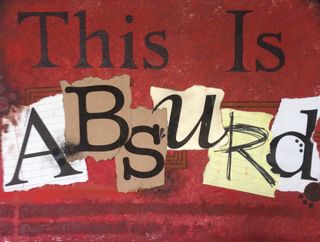It Doesn't Matter
It Doesn't Matter
This common phrase maybe the most existential thing you say.

Source: William Berry / Art by Carlos Andres Lopez
As with, “it is what it is," “it doesn’t matter” is often meant facetiously. The individual is usually frustrated or angry, and says it with an air of resignation. In truth, it does matter to him, but he is resigned that it doesn’t seem to matter to the other. In a way, he may be trying to convince himself that it doesn’t matter.
“It doesn’t matter” memes are associated with philosophy. The words have been attributed to nihilists, existentialists, and absurdists as a mantra. The three of these philosophies have, at their core, the same belief: Life is inherently meaningless. The response to this meaninglessness is what makes them different. Because as a therapist I am concerned with the response, this post will focus on the existential. Existentialists believe that it is important to create a meaningful existence out of this meaninglessness.
Many people do not want to accept that life is inherently meaningless. Others argue that this is what leads to the creation of gods. It is not the purpose of this post to argue in that vain. Instead, it might be worthwhile to look at meaninglessness and how it might be beneficial.
As I’ve written in previous posts (You’re unimportant; but it doesn’t mean you can’t be happy) the point life is meaningless, and more specifically, that your life is inherently meaningless, can be freeing. The initial reaction to the meaninglessness of life is to sadness, perhaps even feeling that if it is meaningless, why do anything? In an excellent book, after an existential crisis of his own, Mark Manson answers this: “I came to the startling realization that if there really is no reason to do anything, then there is also no reason to not do anything” (italics in original) (p.196). Meaninglessness becomes freedom.
When one says, “it doesn’t matter," in effect, she is saying she wants to remove the meaning from the event. Often this is because the meaning, perhaps the expectations attached to the meaning, are causing pain. “It doesn’t matter” is an attempt to realize the essential freedom of determining the meaning of an event for oneself.
“It doesn’t matter” is a statement of fact that one is trying, but perhaps struggling, to accept. It is a realization that in the grand scheme of things, this, usually minuscule event, doesn’t matter. That in a few hours, weeks, or perhaps months, this event you are saying “it doesn’t matter” about, will be long forgotten. Try to remember a time over a week ago when you said, “it doesn’t matter” despite feeling it did. Does that event matter now?
Most of what we experience as emotional pain is ego-based: it’s an attachment to our idea of how others should behave. One’s pride gets hurt. The ego is trying to protect oneself from dangers, and in the moment, it perceives a threat. The threat is usually just to one’s sense of security or emotional wellbeing. But the ego feels threatened far too easily most of the time. Overcoming this ego-based reaction is the beginning of enlightenment.
This is only to speak of actual events that happen. As much relevance as, “it doesn’t matter” has with reality, it has even more so with thoughts. As I’ve written too many times to count, (see "The Big Lie" for example) much of one’s thinking is simple absurdity. Humans worry about non-existent possible futures, about how they might have done something differently in the past, or their mind simply runs away with them without thought to whether these thoughts matter. “It doesn’t matter” is a wonderful challenge to these thoughts.
It doesn’t matter," like, “it is what it is," is a statement of
enlightenment that precedes actual awakening. This awakening is to the
realization that, in actuality, little really does matter, especially
anything one would say, “it doesn’t matter” to. It is also to the
essential freedom that one creates the meaning of their life, and the
events therein. This freedom, this overcoming of ego-based thinking, is
enlightenment. It is what it is, and it doesn’t matter.

